Ditapis dengan
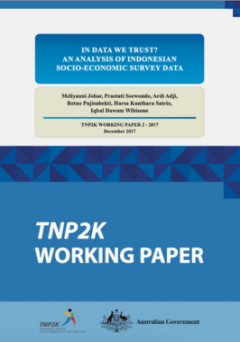
In Data We Trust? An Analysis Of Indonesian Socio-Economic Survey Data
What if a popular data set that has generated a long stream of literature has been misunderstood and has led to misleading inferences? In this paper, we use the case of household expenditure in the Indonesian National Socio-Economic Survey data, SUSENAS, which started over 50 years ago. Appropriate use of SUSENAS for policy analysis requires an understanding that the expenditure variable in SUS…
- Edisi
- Working Paper 2
- ISBN/ISSN
- -
- Deskripsi Fisik
- PDF, 24 Halaman
- Judul Seri
- Working Paper
- No. Panggil
- 300.72 JOH i
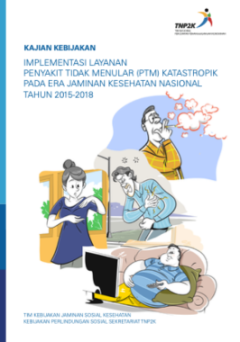
Kajian Kebijakan: Implementasi Layanan Penyakit Tidak Menular (PTM) Katastrop…
Penyakit tidak menular (PTM) katastropik telah menjadi penyebab kematian utama di dunia dengan prevalensi yang terus meningkat pada kelompok usia produktif. Peningkatan terjadi tidak saja di negara maju, melainkan juga di negara berkembang. Beban ekonomi karena PTM diestimasikan mencapai $4,47 triliun atau setara dengan $17.683 per kapita dari 2012 hingga 2030 (Bloom et al., 2015).
- Edisi
- 1
- ISBN/ISSN
- 978-602-275-223-3
- Deskripsi Fisik
- PDF, 86 Halaman
- Judul Seri
- Textbook dan Ebook
- No. Panggil
- 368.3 SOE k
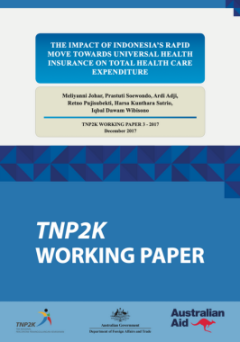
The Impact of Indonesia’s Rapid Move Towards Universal Health Insurance on …
Social health insurance in Indonesia dates from the 1990s but recently in 2014, the government announced its ambition to achieve universal coverage within five years. Jaminan Kesehatan Nasional (JKN) integrates all existing social health insurance schemes under one manager and one payer, the central Ministry of Health. Compared to previous schemes, JKN offers more generous benefits and can be a…
- Edisi
- TNP2K Working Paper 3 - 2017
- ISBN/ISSN
- -
- Deskripsi Fisik
- iii, 31 Halaman, PDF
- Judul Seri
- Working Paper
- No. Panggil
- 368.42 JOH t
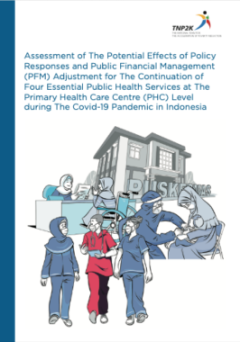
Assessment of The Potential Effects of Policy Responses and Public Financial …
Since 2020, the Government of Indonesia has been adjusting its policy settings and refocusing and reallocating its budget to accelerate the COVID-19 pandemic response. These policy responses could impact on other essential health services, including maternal and child health (MCH), immunisation, nutrition, and family planning during the COVID-19 pandemic. This report aims to rapidly assess the …
- Edisi
- 1
- ISBN/ISSN
- 978-602-275-218-9
- Deskripsi Fisik
- PDF, 56 Halaman
- Judul Seri
- Textbook dan Ebook
- No. Panggil
- 610 SOE a
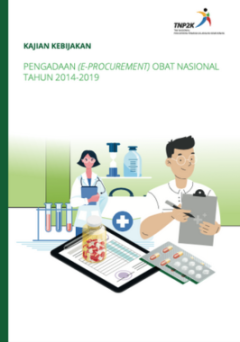
Kajian Kebijakan: Pengadaan (E-Procurement) Obat Nasional Tahun 2014-2019
Penerapan sistem e-Procurement untuk pengadaan obat program Jaminan Kesehatan Nasional (JKN) diharapkan dapat mempercepat pengadaan dan pembelian obat. Untuk membantu fasilitas kesehatan mendapatkan obat-obatan yang lebih murah, pemerintah membuat katalog obat di platform e-Katalog di bawah Lembaga Kebijakan Pengadaan Barang/Jasa Pemerintah (LKPP), dengan perusahaan farmasi mengajukan penawaran…
- Edisi
- 1
- ISBN/ISSN
- 978-602-275-224-0
- Deskripsi Fisik
- PDF, 78 Halaman
- Judul Seri
- Textbook dan Ebook
- No. Panggil
- 610 SOE k
 Karya Umum
Karya Umum  Filsafat
Filsafat  Agama
Agama  Ilmu-ilmu Sosial
Ilmu-ilmu Sosial  Bahasa
Bahasa  Ilmu-ilmu Murni
Ilmu-ilmu Murni  Ilmu-ilmu Terapan
Ilmu-ilmu Terapan  Kesenian, Hiburan, dan Olahraga
Kesenian, Hiburan, dan Olahraga  Kesusastraan
Kesusastraan  Geografi dan Sejarah
Geografi dan Sejarah